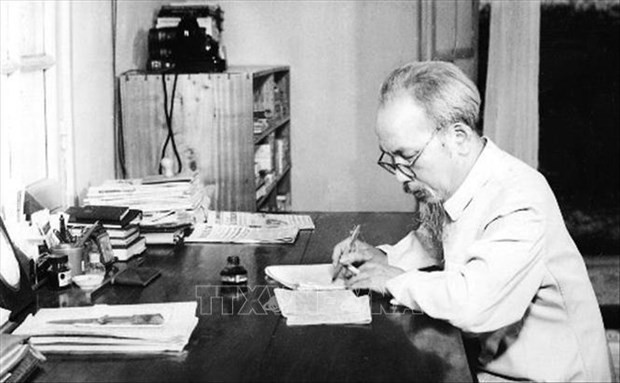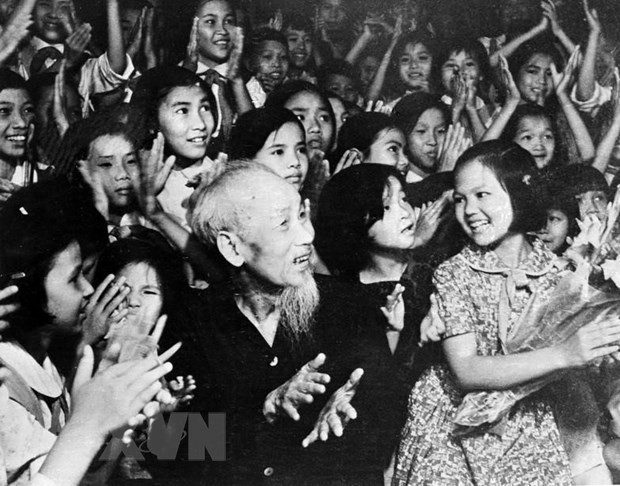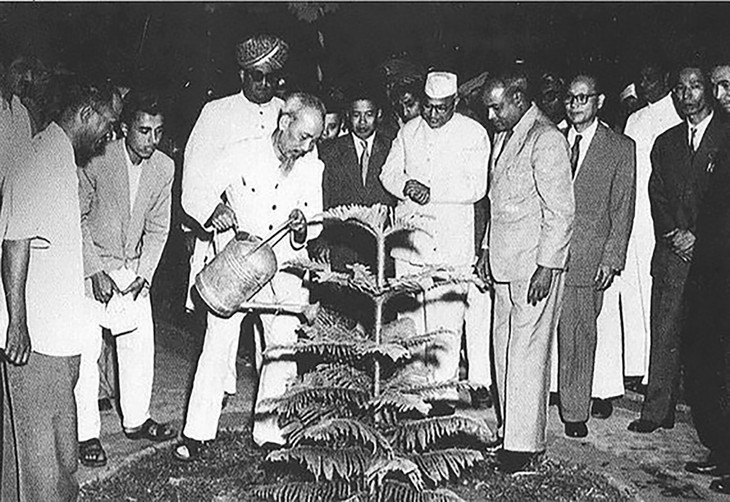B: To mark the occasion, many activities have been held. In our Letter Box segment today, we’d like to give you some facts about our beloved President.
 President Ho Chi Minh (Photo: VNA) President Ho Chi Minh (Photo: VNA) |
A: President Ho Chi Minh was born Nguyen Sinh Cung on 19 May, 1890, in Kim Lien village in Nghe An province in central Vietnam. He was also known as Nguyen Tat Thanh, and Nguyen Ai Quoc.
B: In 1911, he left the country seeking national salvation. He visited various countries where he did different jobs. He participated in many revolutionary movements while making great efforts for his own nation’s independence and freedom.
A: In 1925, he founded the Vietnamese Revolutionary Youth Association in Guangzhou (China) and organized the “Communist League” as the core of the association, training communist cadres to lead the association and popularize Marxism-Leninism in Vietnam.
B: On February 3, 1930, he presided over the Party Founding Conference in Hong Kong, China to establish the Communist Party of Vietnam (later renamed the Indochina Communist Party, the Vietnam Workers’ Party and nowadays the Communist Party of Vietnam).
 (Photo: VNA) (Photo: VNA) |
A: From 1930 to 1940, Ho Chi Minh engaged in activities to liberate the Vietnamese nation and other oppressed peoples. In 1941, he returned Vietnam, convening the 8th Conference of the Central Committee of the Indochina Communist Party, deciding the way for national salvation, establishing the Vietnamese Independent Alliance Association (Viet Minh).
B: On September 2, 1945, at Ba Dinh Square, Ho Chi Minh read the Declaration of Independence to establish the Democratic Republic of Vietnam, now the Socialist Republic of Vietnam. He became President of the Democratic Republic of Vietnam in 1946.
A: On December 13, 1946, he called for national resistance against the French colonialists for the sake of national independence and freedom. Under the leadership of the Party headed by President Ho Chi Minh, Vietnam won the resounding Dien Bien Phu victory in 1954, putting an end to French colonialism in Vietnam.
B: After the north was liberated in 1954, the Party and President Ho Chi Minh continued to lead the anti-US war and the building of socialism in north Vietnam.
 (File photo) (File photo) |
A: President Ho Chi Minh was the great master of the Vietnamese revolution, the beloved leader of the Vietnamese working class and the entire nation, an eminent soldier, a brilliant activist of international communist and national liberation movements. He passed away on September 2, 1969 at the age of 79.
B: VOV’s listeners have showed their respect for President HCM. Xue Fei of China, a listener of the Chinese Service wrote in his entry to our contest “What do you know about Vietnam” last year: “When talking about Vietnam, we can’t help talking about beloved leader Ho Chi Minh. President Ho Chi Minh is respected by not only Vietnamese people but by peoples around the world. People around the world talk about Vietnam-Ho Chi Minh with respect and admiration.”
A: Johnny Antonio Ramírez López of Peru, who listens to our Spanish Service, said: “President Ho Chi Minh, the founder of the Democratic Republic of Vietnam, now the Socialist Republic of Vietnam, was a brilliant poet, military strategist, and leader of Vietnam. He was an important and respected figure of the 20th century.”
B: Sergey Afanasyev of Ukraine, who listens to our Russian Service, called President Ho Chi Minh “a great person”. Sergey said he will visit Uncle Ho’s stilt house if he gets a chance to visit Vietnam.
A: Rabi Sankar Bosu of India, who listens to our English Service, told us that he has been greatly touched by the life and legacy of President Ho Chi Minh since he was a pupil.
B: He said: “Vietnam has a special connection with the people of India, particularly Kolkata, the capital of West Bengal. Vietnam and Ho Chi Minh are familiar names in Indian households, particularly in West Bengal. To express solidarity with Vietnam during its long, difficult years of liberation wars between 1945 and 1975, the people of Kolkata displayed images of Ho Chi Minh and chanted in Bengali: ‘Your name, my name, Vietnam-Vietnam’ and ‘Ho Chi Minh – We will win – We will win.’”
A: This Sunday, 69 million Vietnamese people will cast their ballots for the election of the National Assembly and all-level People’s Councils for the 2021-2026 tenure.
B: Commenting on our stories about Vietnam’s upcoming election, many listeners asked about election procedures in Vietnam.
A: The current election regime in Vietnam is in the 2013 Constitution and further detailed in the 2015 Law on Election of National Assembly Deputies and People’s Council Deputies.
B: The first principle, universal suffrage, guarantees the people’s widespread participation in the election. All eligible citizens are entitled to exercise the rights to vote and to stand for election and the Vietnamese State has the obligation to legally guarantee and create favourable conditions for citizens to exercise their rights.
A: Equality in elections means equal opportunity without any discrimination based on gender, ethnicity, age, social class, political tendency, position, occupation, among others. This principle concentrates on two aspects: equality among voters and equality among candidates.
B: The third principle is direct election, which means that voters directly express their will through their ballots, directly selecting their representatives without any intermediary.
A: The final principle, secret ballot, constitutes a measure to ensure that voters are free to express their will when selecting their representatives without any influence. The election, especially the stages of filling out and casting ballots, must be organized in a way that ensures no one could know voters’ choices.
B: Every citizen aged 18 and older has the right to vote. Every citizen who reaches the age of 21 has the right to stand for election to the National Assembly or People’s Councils.
A: Preparations for the elections have been completed nationwide. Early election has been held in some constituencies.
B: In an email to VOV this week, Siddhartha Bhattacharjee of India asked about an update of COVID-19 vaccination in Vietnam.
A: By Wednesday morning, Vietnam had had more than 4,500 COVID-19 cases including more than 2,600 recoveries and 37 deaths.
B: More than one million COVID-19 vaccine shots were given to frontline personnel including medical workers and members of community-based anti-COVID-19 groups in Vietnam. The Ministry of Health said that Vietnam will receive 31 million Pfizer-BioNTech vaccine doses in Quarter III and Quarter IV.
A: Around 110 million doses will be supplied for Vietnam this year including 39 million from COVAX Facility, 30 million from AstraZeneca, and 31 million from Pfizer-BioNTech, says the Vietnamese Minister of Health.
B: The ministry has registered to buy additional 10 million doses through COVAX under the cost share mechanism.
A: With expanding vaccination coverage and our strengthened efforts to fight COVID-19, we hope that we will soon resume our normal life and we wish everybody around the world safe and sound.
B: This has been another edition of VOV’s Letter Box. We always welcome your feedback at: English Service, VOVworld, the Voice of Vietnam, 45 Ba Trieu street, Hanoi, Vietnam. Or you can email us at: englishsection@vov.vn. You’re invited to visit us online at vovworld.vn, where you can hear both live and recorded programs. Thank you. Goodbye until next time.